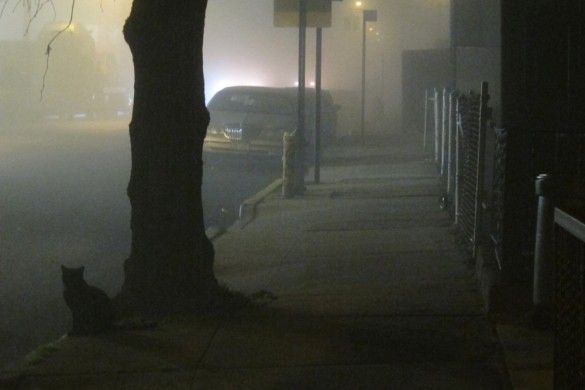It’s A Good Day In Sheepshead Bay: A Morning With Mookie On The Marina

The following story – an unexpected delight! – landed in my inbox this morning from Mickie Whitley, a 13-year resident of Sheepshead Bay. “This neighborhood is one of those which has a very tangible natural presence and I find the juxtaposition of this in New York City to be fascinating,” she wrote to us. Then she attached the following story, which we’re happy to share with you.
When I was a child, there was a saying grown-ups used whenever bored children would whine on rainy days: April Showers bring May Flowers. Now it’s May and the jonquils and tulips on Emmons are entering retirement, so what else does a spring rain bring? Fog.
I love the marina in the early mornings. Pre-dawn is when the neighborhood wears its quietest and most contemplative personality. This morning it was the call of the boats that drew me outside. That long, low tone of the fog horn is one of the most haunting and romanticized sounds in the memories and literature of this wayfaring country. Whether by ocean, lake or river, few in America have lived never having heard this plaintive call which both mourns the past and forges the future with one beautiful, paradoxical note… and there’s nothing America loves better than a good paradox.
The air this morning is magnificently quiet. Half a block away, I can hear water dripping from the leaves in the Holocaust Memorial Park and startling still slumbering sparrows. Like the Irish Hunger Memorial in Manhattan, some of the city’s most beautiful and rejuvenating quiet places are built in remembrance of some of the ugliest and debilitating actions of our human selves – another wonderful paradox. The rumble of a truck bounces high off the apartment buildings as The Daily News makes its appointed rounds. One of my most cherished memories of living in Brooklyn, which may seem quaintly old-fashioned in this technological age, is seeing and hearing the news literally hitting the streets.
The tide is coming in to work but the only thing stirring with any of this borough’s ambition is the mist. One gazes towards where the horizon should be and sees only the blurry lights of satiated restaurants and partied-out party boats. The Baku Palace digital display is rendered blissfully illegible and becomes just another sleepy blinking eye wrapped in a cozy, gray blanket. The water is still dark, broken only by small white swan skiffs bobbing in nearly invisible waves, but there is a lighter shade of dark contrasting the Manhattan Beach tree tops. Dawn is coming.
Soon, a single skiff raises its sinuous mast and issues one of the strangest calls (so indescribably odd) in nature… revelry call for the swans. As feathers are fluffed and preened, two swans begin dancing in the heart-signatured ritual of mating and glide out of sight under the footbridge. By the time the water changes to liquid sapphire, the flock is systematically patrolling the sea walls looking for an easy mark. Unless I want to raise unrealistic expectations of breakfast, it is time to move from my station. I have such a weak spot for our swans.
The fog smells different in the city than in the country. Here, it can smell very high of the briny deep, especially at low tide, but this morning holds a clear, wet smell of clean concrete. It is a smell of permanence and growth in one breath. Beautiful young men with dark glossy hair and ebony eyes are the first en masse travelers of the streets; the stock boys are going home and the delivery guys are coming on duty.
The sound of distant thunder harmonizes with a train clattering purposely on the tracks over Emmons-turned-Neptune. I see the industrious, red glare of the Q but the B should be starting the daily commute anytime now, too. I stop by the Emmons Deli (Zephyr’s Superette) for my habitual visit with Mookie, the resident six-toed, tuxedo cat. Polydactyl or “mitten footed” cats are created by a congenital abnormality, supposedly brought over with the Puritans (a quintessential American history), to recur predominantly in coastal American cats. The strain is also found in Swedish, Welsh and Cornish Coast cats but not mainland Europe. The marina is a fitting home for Mookie; polydactyl cats were greatly desired as ships’ cats by early American sea captains because they, in particular, are believed to bring luck.
So I scratch Mookie’s ears while “breath[ing] deep of that yet sweet and lucid air” and feel lucky. Whatever history is written later this afternoon, this morning started by being a beautiful foggy day in Sheepshead Bay.




